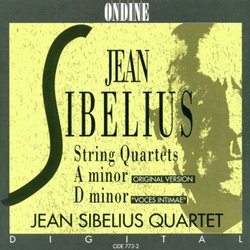| All Artists: Jean Sibelius Title: Sibelius: String Quartets Members Wishing: 0 Total Copies: 0 Label: Ondine Release Date: 2/1/1995 Genre: Classical Styles: Chamber Music, Historical Periods, Classical (c.1770-1830) Number of Discs: 1 SwapaCD Credits: 1 UPC: 761195077320 |
Search - Jean Sibelius :: Sibelius: String Quartets
 | Jean Sibelius Sibelius: String Quartets Genre: Classical
|
Larger Image |
CD Details |
CD ReviewsForetelling the bitter future's shadows! Hiram Gomez Pardo | Valencia, Venezuela | 03/22/2005 (5 out of 5 stars) ""I am myself a man of the orchestra. You must judge me for my orchestral works". These words are an evident proof of this observation of Sibelius's biographer Harold Johnson who wrote: "Voces intimae neither palys nor sounds like a string quartet. The impression produced on both players and listeners is that Sibelius wrote it with the strings of the orchestra in mind"
If I had to describe with the most appropriate words this overwhelming work I would entitle as the most passionate romantic pantheist chamber work ever written previous or later. Sibelius was composing inspired by ancient memories but unconsciously looking forward those distant future echoes. If you pay special attention, my dear reader you can feel some furtive auditional images of Schoenberg' s Verklaerte Nacht, for instance, along the development of the third Movement. If we have to admit the presence of Schubert'' s presence in the Fourth Movement suggesting us , perhaps, echoes of the Death and the Maiden, and certain lyrics phrases of Brahms' First Movement of the Somata No. 1 Op. 38, Sibelius interweaves with superb mastery a smart musical wrap with post romantic inflexions. The obsessive main musical theme announced by the cello in the first attack will prevail hidden between the trees of this forest., spying on us from time to time. The last movement is deeply struggling and even symphonic. You can perceive the final of his third Symphony for instance. Acquire this fundamental artwork. One of the supreme achievements of that remarkable and everlasting ensemble like the Jean Sibelius String Quartet. " |

 Track Listings (9) - Disc #1
Track Listings (9) - Disc #1